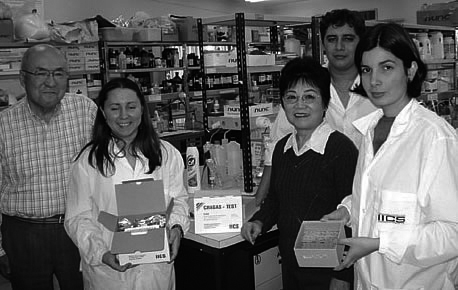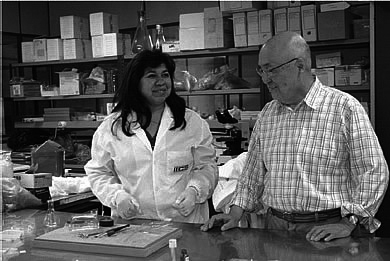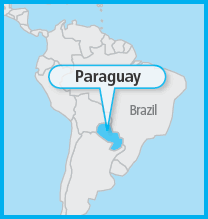Japan's Official Development Assistance White Paper 2009
Column 10 Struggling with Chagas' Disease in Paraguay
— The Challenge of Transitioning From a University resident to a Senior Volunteer —
"I first came to Paraguay in 1988, so it has already been 20 years," says Mr. Fujiro Sendo, the former President of Yamagata University, speaks nostalgically of his past visits to the country. Since January 2008, Mr. Sendo has been engaging in measures against infectious diseases, focusing on Chagas' disease at the National University of Asuncion Health Sciences Research Institute (Instituto de Investigaciones en Ciencias de la Salud, IICS) as a senior volunteer with the Japan International Cooperation Agency (JICA).
Chagas' disease is a potentially fatal infectious disease that develops after being transmitted by parasites. While measures against infectious diseases have been progressing on a global scale, the results have yet to spread to all places of Paraguay. Mr. Sendo has been dispatched in response to a request to establish the basic techniques for research on infectious diseases in Paraguay and to foster human resources to succeed these techniques.
Mr. Sendo, dispatched 13 times, even before the current mission, has engaged in measures against Chagas' disease and other infectious diseases together with IICS researchers, mainly as a member of JICA medical survey teams, and has provided guidance on topics such as the development of Chagas' disease diagnosis kits. Chagas' disease is an illness that often develops in poor rural villages where there is a lot of mud wall and thatched roofs. Medical facilities are often not sufficient in such villages, so the development of diagnosis kits is greatly contributing to facilitating the simple diagnosis of Chagas' disease.
Among his activities, Mr. Sendo is particularly focusing his efforts on fostering human resources. In order to carry out continued research in Paraguay which does not have sufficient equipment unlike Japan, the most important element is the "people" who handle the limited equipment. Mr. Sendo comments, "It does not matter how much equipment you have if there aren't people to use it." Measures to fight against Chagas' disease began in March 1988, and the ice-making machine that JICA provided at that time is still being used at IICS. Using the same equipment for 21 years would be unthinkable in Japan. This is an example which shows that the researchers are using the equipment with care. No matter how old the equipment, if you are determined to do research and have the skills to make the best of what you have, then you will be able to research." In order to strengthen human resources, Mr. Sendo has also been in involved in the establishment of graduate schools, and currently he is well-known among researchers as a graduate school lecturer.
Dr. Elva Serna, who has known Mr. Sendo for almost 20 years, says, "Mr. Sendo is a very friendly and respectable man. I am very honored to have a chance to work with him again." Elva visited Japan in 1992 for JICA Training, and she did research under Mr. Sendo who at that time was a professor of the Faculty of Medicine in Yamagata University. Now, in addition to research, Elva visits poor villages and informs them of the devastation caused by infectious diseases. She says, "I am making significant use of what I learned during my training in Japan in my research. Going forward, I will work so that diagnosis kits reach poor children." In order to develop human resources like Elva who will contribute to fighting infectious diseases in their home country Paraguay, a doctoral program will be established at IICS in two years which aims at fostering researchers with even higher skills.
Mr. Sendo states, "The good thing about being a volunteer is that you get to see many things because you become immersed in the local way of life and work together with the people. You can identify new issues. This is something I was not able to do when I was in the survey teams. I intend to continue assisting the fight against infectious diseases in Paraguay."

Mr. Sendo and IICS researchers holding diagnosis kits (Photo: Mr. Sendo).

Mr. Sendo (right) and Elva (Photo: Mr. Sendo).

